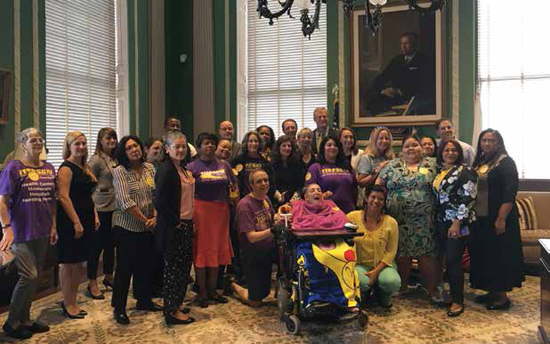WORKERS FLEX AT THE BARGAINING TABLE
October 17, 2019
Members fend off givebacks and make benefit gains in new contracts.

The three-year agreement covers 50,000 workers and increases the starting wage for PCAs to $16.10 an hour by July 2021. Workers safeguarded training benefits, and maintained opportunities for CNA classes and certification, plus pre-paid tuition vouchers for college enrollment. Workers also secured expanded time off and the opportunity to create an employee assistance program.
“I’m so excited for the new paid time off benefit,” said Maggie Connors, a PCA from Danvers, MA. “We need to take time off to be with our own families and rest and relax just like everyone else. And now we can.”
Gov. Baker praised PCAs for their invaluable work and their efforts in building a partnership with the Commonwealth of Massachusetts.
“We continue to believe in the work that you do, and we especially believe in the work that you do on behalf of your patients,” said Baker.
“We really appreciate you and the partnership and your work on behalf of so many people day in and day out.”
The 1,000 researchers, clerical, library, technical, and other staff in the Columbia University Medical Center’s Support Staff Area Unit in Manhattan ended four months of negotiations on a high note in early August.
Columbia workers settled a three-year agreement that includes annual 3% wage increases and no deductibles for their Choice In-Network healthcare plan. Columbia repeatedly insisted that they couldn’t afford the Union negotiated Choice In-Network plan without imposing deductibles.

After negotiating throughout the summer and facing down proposed givebacks, 450 clerical and cafeteria members at Columbia University’s Morningside Campus in late August won a three-year agreement that includes 3% annual pay increases, retroactive raises, and maintenance of coverage under the 1199SEIU Training and Upgrading and Child Care Funds, and an increase to $220 per week for cafeteria and dining staff furloughed over the summer months, regardless of years of service.
Columbia management initially refused to back-date wage increases, but to demonstrate their power, members packed negotiations, forcing the wealthy institution to relent.
Audrey Ross has worked as a bibliographic assistant at Columbia University’s Butler Library for 40 years. A delegate since 1997 and on the verge of retirement, Ross said this is the last contract she will negotiate and was pleased to see that the members are still prepared to come in numbers when it counts.
“We’ve had rallies in the past, but to see all those members inside the building making all that noise at negotiations and taking the management lawyer to task was really refreshing. In the end, that is what made the difference,” said Ross.
Workers at Georgetown University in Washington, D.C. also held management’s feet to the fire, and in early August settled a three-year contract that includes yearly 3.5 % wage increases, good successorship language and, for the first time, parking fees that don’t cut into wage gains. The 375-member bargaining unit at Georgetown includes housekeepers, electricians, maintenance workers, floor techs, and bus drivers. In the past, workers at Georgetown have struggled with university-imposed parking costs zeroing out contractual wage increases. And the rising costs of living in D.C. and its environs have exacerbated the problem. Workers were determined to settle a contract that provided fair wages and benefits.
To do it they held sticker days, walkins, and rallies that drew support from the university’s students and community as well as 1199ers from institutions around Georgetown.
“When Georgetown saw our support from the students, the university was like ‘we may have to rethink this,’” said negotiating committee member Alice Affolter, a bus driver at the institution for 10 years. “It really makes you feel amazing. Since we won our contract, we are definitely treated with more respect.”
After winning their first 1199SEIU contract with a unanimous vote in early September, Gary Mastropolo said he and the other respiratory therapists (RTs) at Blythedale Children’s Hospital in Valhalla, NY felt “relief and joy.”
“We remove the trach from a preemie who is trying to breathe on its own—and we calmly explain to the anxious parents what’s happening. We save the lives of scores of middle schoolers and teenagers who suffer from acute asthma. Each one of my co-workers has said they love their job and are dedicated to their young patients—but over the years, management made it more difficult for us to do our jobs, and morale was sinking. That’s when we started to organize. We became 1199 members in five months,” said Mastropolo.
Management delayed contract negotiations for five years with administrative turnover and increasingly unreasonable proposals, including the addition of a shift and the elimination of set schedules.
“Ironically, the more management didn’t listen to us and the more uninformed their proposals became, the stronger we became, both in numbers and spirit,” Mastropolo says.
The new contract, ratified on Sept. 19, protects set scheduling for incumbent RTs. They will also receive annual raises and bonuses ranging from 2.5% to 3% and lump sum bonuses of up to 2.5%. The RTs also won commencement of experience steps six months earlier, yielding annual pay bumps of up to $500.
Their coverage under the National Benefit and Training and Upgrading Funds begins Jan. 1, 2020.
1199 Magazine | September / October 2019

